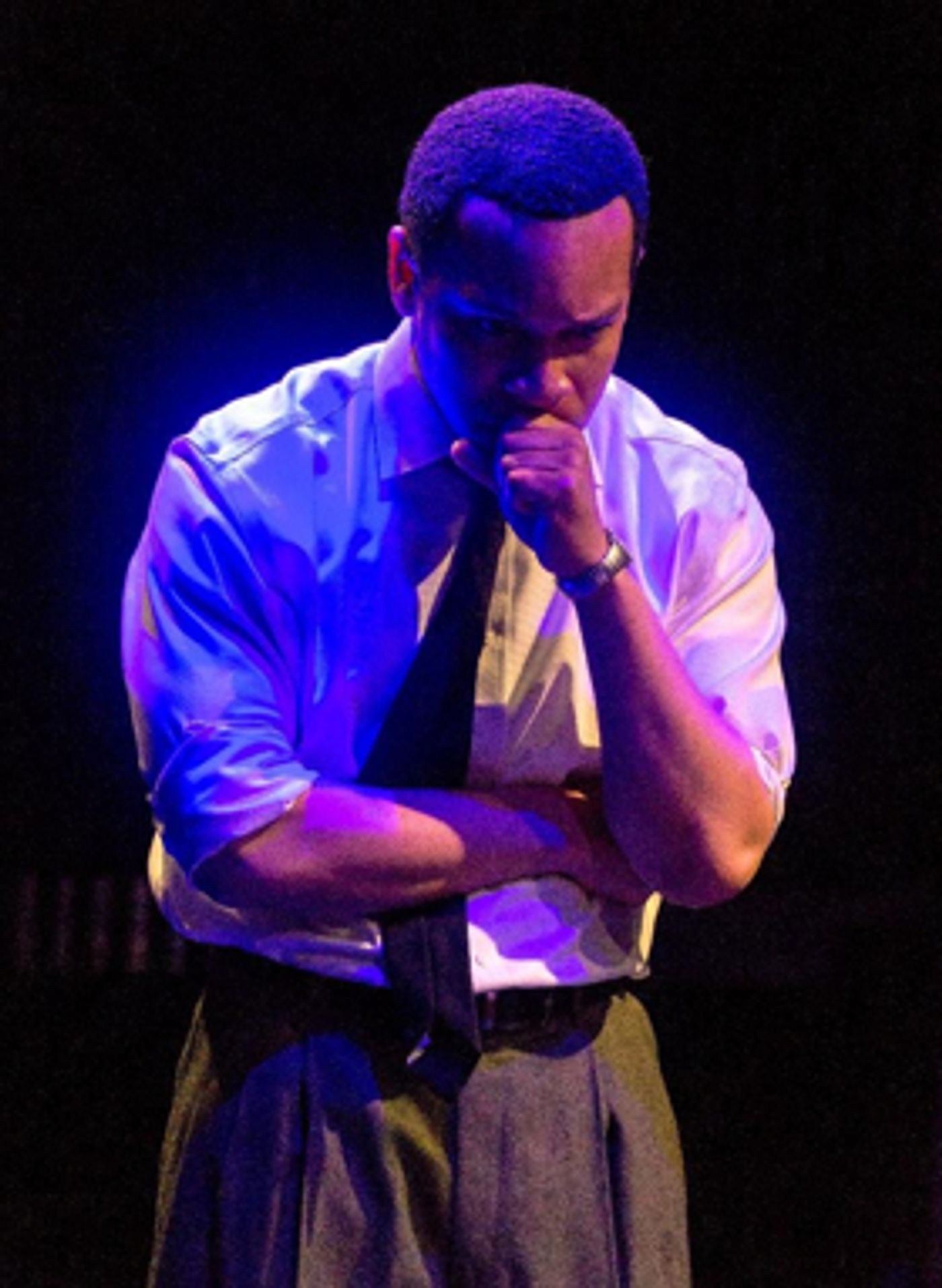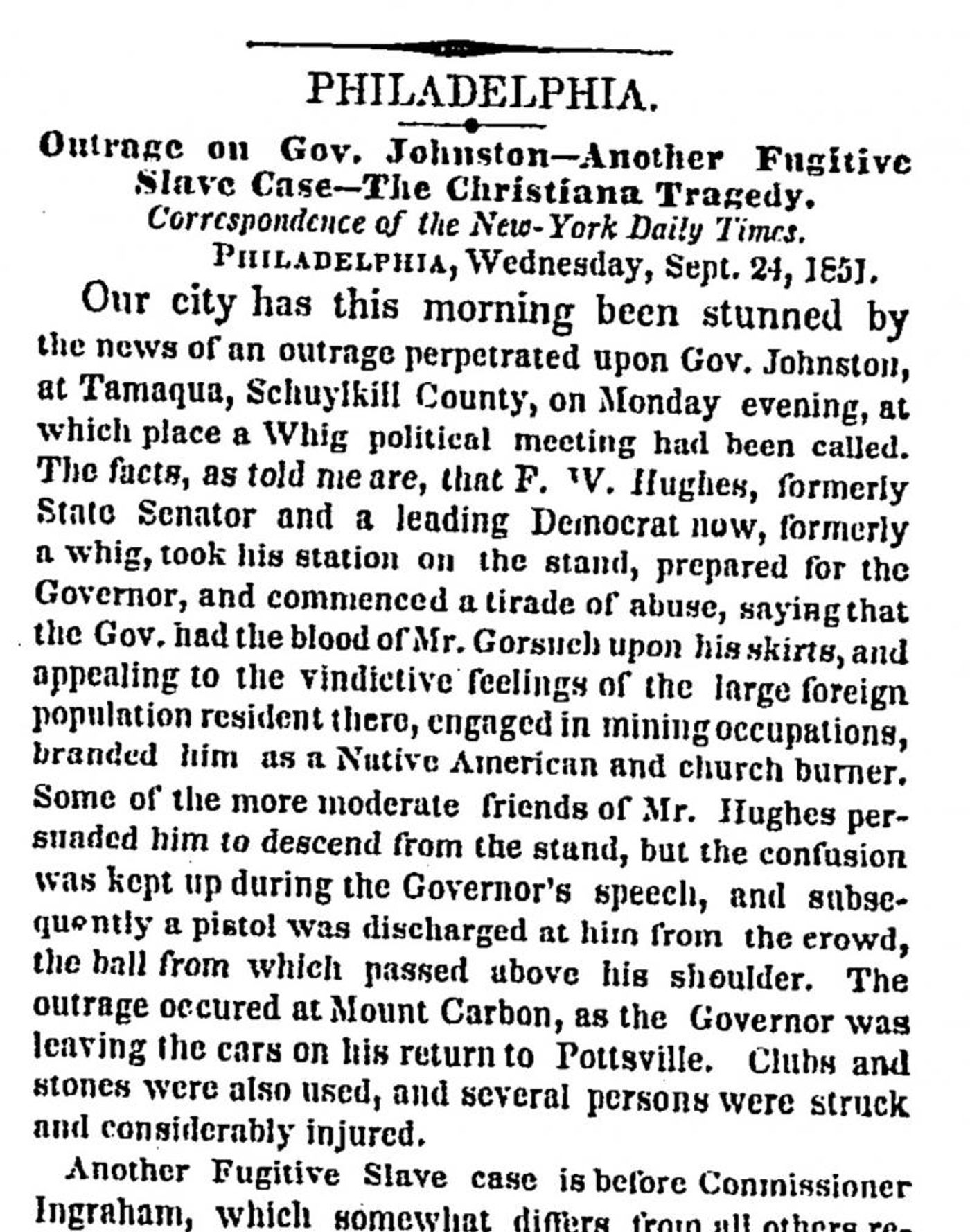Review: MST Opens Wilting DAISY, but Admirably Tackles Perennial Debate

The DAISY performance I attended at Main Street Theater was plagued by line flubs and technical issues, but I left the black box venue talking more about the thematic implications of the play than the flaws of the show, which is a testament to the intrinsic quality of the play and the underlying potential of the production.
DAISY recounts the creation of the same-named political advertisement run by Lyndon B. Johnson's 1964 presidential campaign. The infamous TV spot unites the image and sound of a fair-haired little girl counting white flower petals innocently and incorrectly while a harsh adult male voice counts down to detonation before quickly cutting to a nuclear mushroom cloud. Moralistic marketeer Louise Brown (Rachael Logue), jaded Madison Avenue vet Sid Myers (Rhett Martinez), infirmed goofball Aaron Ehrlich (Aaron Echegaray) and agoraphobic communications genius Tony Schwartz (Jonathan Minchew-Gonzalez) are the copywriting team behind the shocking advert.
The writers are in the service of Clifford Lewis (Brandon C. Balque), advisor to the president, White House deputy special counsel, and the only black man to move on up to an efficiency office in the White House basement.
DAISY is an interrogation of the current political arena, which is fun to watch, even when a dubious argument is presented. The central character, idealistic idea woman, Louise, is one such dubious argument.
DAISY is based on actual events, but Louise is a complete fabrication. It's notable because Louise is the character most out of place. She's a seasoned ad executive genuinely unaware that advertising aims to influence behavior and under the impression that Doyle Dane Bernbach chooses clients based on merit. She's written that way, not because playwright Sean Devine wanted to imply that the only woman on staff at a high-powered PR firm is horrible at her job but because, in a world of characters, Louise is an argument. She's there to be the literal embodiment of Cambridge Analytica's Twitter page. She argues that political discussion has never hinged on the negativity of an opponent. It has always been driven by comparing the better qualities of each candidate.
When faced with this assertion, I'm reminded of a 1851 New York Times (née New-York Daily Times) article. The newspaper reported on a verbal attack by F.W. Hughes, former state senator and Whig, current Democrat, against political opponent Pennsylvania governor and Whig, William F. Johnston. Hughes called Johnston a "Native American" and a "church burner," and added that the Pennsylvania governor had the blood of Edward Gorsuch, a Maryland slaveholder and the only casualty of the Christiana Riot, "upon his skirts."
It may not seem so, but implying that then Senator Barry Goldwater will cause a nuclear holocaust in 1964 is just as inflammatory as saying Governor William F. Johnston was a "church burner" and "Native American" in 1851.
But an easily dismissed argument is forgivable. The real questions: Had the Whig-turned-Democrat had access to TV and Twitter, would he be so different from Donald Trump? We've had irascible men (Andrew Jackson), political virgins (Carter) and feckless, indecisive individuals (Buchanan) serve as president, but have we ever had all three in one?These are the questions raised by DAISY. I don't know the answer and I reckon no one does. They're unanswerable questions and, like all unanswerable questions, it transports one to the intersection of pleasure and pain. No living creature can resist the urge to lick and gnaw at a thorn in the paw. This is why we foist plastic Elizabethan collars on dogs and cats.

a Whig electioneering meeting to declare
his Whig opponent a "church burner" and
nativist.
DAISY also works as an exploration of Tony Schwartz, the sound geek adman known for his groundbreaking theories on sound and media. The play is nearly a love letter to the resonance principle. Meaning is not within the ad, Schwartz would say. The meaning is in the mind of the beholder. To be effective, a communicator must be attuned to the large number of experiences and associations within the receiver. It's nice that friends, Romans and countrymen lend their ears, but meaning is actually made between them.
The production struggles to match the passionate subjects of the play. Normally, Troy Scheid provides rock-solid direction but, in the case of DAISY, she offers a sluggish production and a bland interpretation of the play. Set designer Jodi Bobrovsky has a unique ability to bring character to black boxes and small performance spaces. In DAISY, her skills are wasted. The same can be said for Rodney Walsworth (Properties Design), Paige Willson (Costume Design), David Gipson (Lighting Design), and especially Jacob Sanchez (Sound Design). In a story where a principal character is obsessed with sound, the uninventive sound design is palpable.
That said, there are scenes where Scheid reveals an inventive nature. She projects an animation of Edward Muybridge's classic "Horse in Motion" photography to underscore a monologue by Minchew-Gonzalez. The technique elevates and illuminates the play. Here, Scheid is the architect of a sublime moment.
The cast gamely takes on any challenge. Rachael Logue gives a stellar performance, turning the baffling contradictions of Louise Brown on the page into a flesh and blood human -- a very unlikeable human, but a human nonetheless. When given the empty shell of a character like Aaron Ehrlich, Aaron Echegaray adds some sauce. It results in a very stereotypical portrayal of a Jewish man, but who am I to judge? I liked Judd Hirsch too much in Independence Day. Echegaray also came up with the zinger of the night when the projections failed, a harbinger of preternatural improvisation powers yet to be seen perhaps? Brandon C. Balque and Jonathan Minchew-Gonzalez have their days in the sun -- scenes of great emotional content that should be seen and savored. And Rutherford Cravens brings just the right amount of authority as Bill Bernbach, co-owner of the agency and Louise's mentor.
Perhaps DAISY itself is a defense of Schwartz's resonance theory. DAISY evokes. The audience informs. And together, the two resonate.
DAISY continues through April 29, 2018 at Main Street Theater - Rice Village, 2540 Times Boulevard. Free post-show talk with John Lienhard ("Engines of Our Ingenuity") at 5:30 p.m. on Sunday, April 15, 2018. Open to the public. Performances are at 7:30 p.m. on Thursdays, Fridays, Saturdays, and Wednesday, April 25, 2018; and 3 p.m. on Sundays. For more information, please call 713-524-6706 or visit mainstreettheater.com. $36 - $45
Photos by John Lienhard
Reader Reviews
Videos

